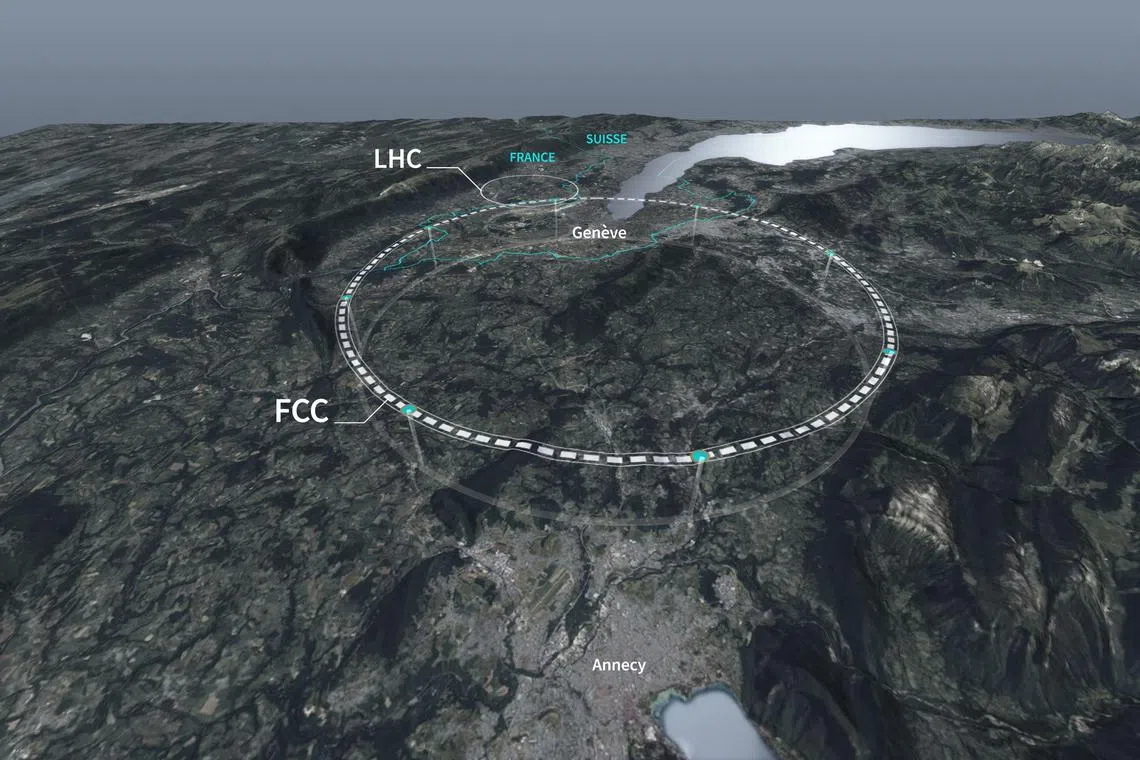European leadership in particle physics threatened by China, says Cern chief
Sign up now: Get ST's newsletters delivered to your inbox

Cern director-general Fabiola Gianotti speaking during an interview with AFP on the Future Particle Collider (FCC) in Meyrin, near Geneva, on March 31.
PHOTO: AFP
GENEVA - Europe’s Cern laboratory chief Fabiola Gianotti told AFP in an interview on March 31 that if a replacement particle collider
Dr Gianotti also downplayed fears over the Future Circular Collider’s (FCC’s) funding and criticism from some scientists the money would be better spent elsewhere.
In 2024, the German government, which is the leading contributor to Cern, expressed reservations about its estimated more than €15 million (S$20 million) cost. Do you understand those reservations?
“A big project always raises questions about its funding. It was the same when the LHC (Large Hadron Collider)... the current instrument, was put on the table for approval. And it’s absolutely obvious and understandable that the member states who finance... Cern are extremely careful. They want to see a very solid cost assessment with very small uncertainties. So we will continue in the next year to improve the assessment of the cost.
“But I think there is full support from the Cern member states to ensure a future for Cern... And I think it’s very important, especially at times of geopolitical conflict and tension, (it’s) very important to invest into good values, into science, into technology, to give hope, also to the younger generation.”
Could the private sector help support the project?
“It’s a possibility, of course, but the bulk of the funding must come from the member states.”
What are the risks if the project does not come to light, given China’s known ambition to acquire the world’s largest particle accelerator?
“There is a real competition, although we collaborate, we work together, Cern has something like 600 researchers coming from China. So there is a real competition.
“There is a real risk that that Europe loses the leadership in fundamental science, in particular in high energy particle physics and the technologies that go with it, and I think it will be a pity.
“And so I think also that it would be good if the European community could choose the project that is best for Cern and not really depend on the choices of other regions.”
What would the FCC bring to people’s daily lives?
“What we do with our colliders is to increase and improve the knowledge of humanity, trying to answer questions that have been with us, human beings, since we started to populate our planet Earth.
“Where are we coming from? Where are we going? These are existential questions that we ask ourselves every day. And so particle physics tries to address those questions.
“Concerning also the impact on our life, the technologies that fundamental research today developed – because fundamental research is a driver of innovation – find applications in many domains of society.
“The World Wide Web was invented at Cern. Accelerators to treat cancers with light ions have been developed at Cern. The PET scanner was developed at Cern and many, many, many others.”
Do you understand the criticisms scientists have made about this project, with some suggesting the funding should go to smaller projects instead?
“I think that, of course, there is always a bit competition between different domains of science, and sometimes there is a little bit of nervousness that if too much money is invested in a field, it will go to the detriment of money in another field.
“But I think what is important for science is to inject money in all fields and not to fight between different domains of science, because money that is injected in science will remain in science.
“Money that is subtracted from science will not go to other domains of science. It will go to somewhere else.” AFP

A Cern image showing tunnels of the planned US$17 billion ($22 billion) Future Circular Collider and the current Large Hadron Collider.
PHOTO: AFP


